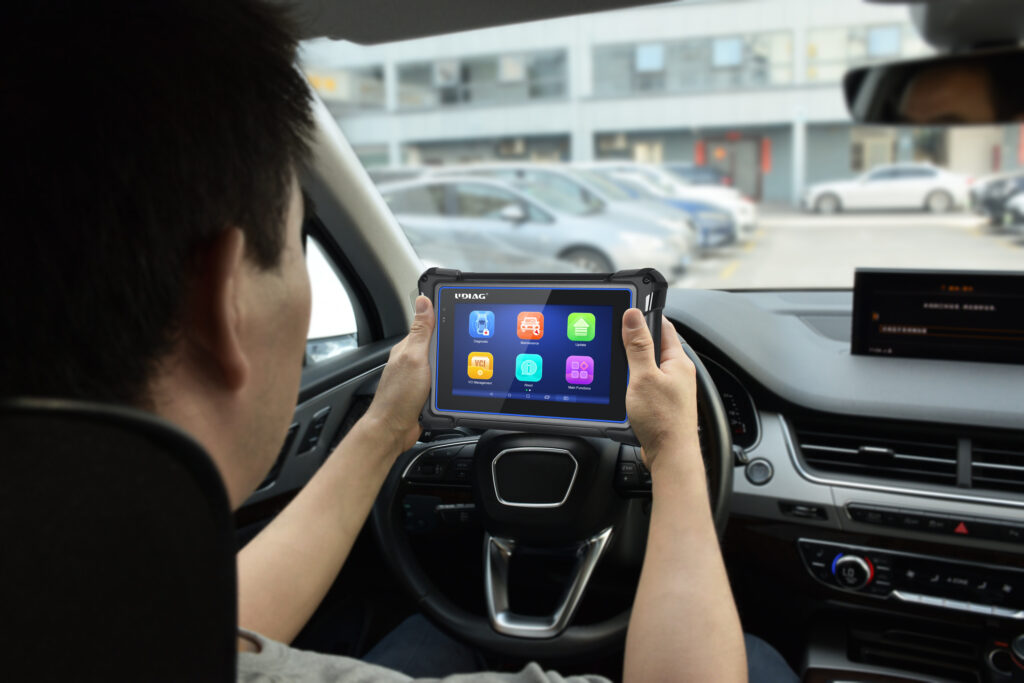Comparing Car Diagnostic Tablets and Traditional OBD Scanners.
2023-10-27 by UDIAG
Are you tired of the ominous “Check Engine” light haunting your driving experience? When your car starts acting up, do you find yourself wondering what’s going on beneath the hood? Well, fret not, for the automotive industry has come a long way in providing us with tools to demystify the enigmatic world of car diagnostics. In this article, we’ll embark on a thrilling journey, delving into the realm of vehicle diagnostics by comparing two prominent players in the field: Car Diagnostic Tablets and Traditional OBD Scanners.
With technology constantly evolving, the way we diagnose and understand our vehicles has evolved as well. In one corner, we have the tried-and-true Traditional OBD Scanners, the old dogs of car diagnostics. In the other corner, we have the innovative and futuristic Car Diagnostic Tablets, ready to revolutionize how we perceive vehicle health. Which one is right for you? That’s what we aim to uncover!
So, fasten your seatbelts, folks, as we navigate through the labyrinth of Comparing Car Diagnostic Tablets and Traditional OBD Scanners to decide which is the ultimate diagnostic companion for your ride!

I. The Basics: OBD Scanners vs. Car Diagnostic Tablets
Let’s kick things off by breaking down the basics of both Car Diagnostic Tablets and Traditional OBD Scanners. What makes them tick? What are their key differences? Let’s find out!

II. Traditional OBD Scanners: The Old Guards
Traditional OBD (On-Board Diagnostics) Scanners are the tried-and-tested stalwarts of vehicle diagnostics. They have been around for decades, serving as a reliable companion to car enthusiasts and mechanics alike. Here’s what you need to know about them:
- Plug and Play: Traditional OBD Scanners typically come in a handheld device that you plug into your car’s OBD port (usually located beneath the dashboard). It’s a cinch to use – just plug it in, and you’re good to go.
- Code Reading: These devices specialize in reading Diagnostic Trouble Codes (DTCs) generated by your car’s computer when something is amiss. They give you a numeric code that you then have to decipher using a codebook or by searching online.
- Affordability: Traditional OBD Scanners are often budget-friendly, making them accessible for home users and DIY mechanics.
- Diagnostics Only: These scanners are primarily focused on diagnostics and may not offer other advanced features like real-time data monitoring or in-depth reports.
- Portability: They are compact and easy to carry around, allowing you to use them on multiple vehicles if needed.
III. Car Diagnostic Tablets: The Future of Diagnostics
Now, let’s meet the new kid on the block, the Car Diagnostic Tablets. These advanced tools are ushering in a new era of vehicle diagnostics. Here’s what sets them apart:
- Wireless Connectivity: Car Diagnostic Tablets often connect wirelessly to your vehicle’s OBD port, reducing clutter and providing mobility during diagnostics.
- User-Friendly Interface: With a larger screen, these tablets offer a more user-friendly and intuitive interface. You don’t need to decode numeric DTCs; instead, you get plain English explanations.
- Real-Time Data: Car Diagnostic Tablets can provide real-time data monitoring of various vehicle parameters, such as engine temperature, speed, and more.
- Multifunctionality: They aren’t just about diagnostics; these tablets often offer additional features like entertainment, GPS, and internet connectivity.
- Software Updates: Car Diagnostic Tablets frequently receive software updates, ensuring they stay up to date with the latest vehicle models and diagnostic codes.
IV. The Showdown: Performance and Usability
Now that we’ve grasped the fundamentals of both contenders, it’s time to dive deeper into the ring and see how they perform in real-world scenarios. After all, it’s the actual performance and user experience that truly matter, right?
V. Traditional OBD Scanners: Battle-Tested Reliability
Performance
- Speedy Diagnostics: Traditional OBD Scanners are known for their speed in retrieving diagnostic codes and providing information, making them an efficient choice for quick checks.
- Compatibility: These scanners are compatible with most vehicles, including older models, ensuring you won’t face any compatibility issues.
- Reliability: Their track record for accuracy and dependability has earned them the trust of professional mechanics for years.
Usability
- Simplicity: If you prefer a no-fuss approach, the simplicity of Traditional OBD Scanners can be a major plus. Plug it in, read the codes, and you’re done.
- No Learning Curve: There’s virtually no learning curve involved – even beginners can use them without any special training.
- Portability: The compact design of these scanners makes them easy to carry in your glovebox or toolbox.
VI. Car Diagnostic Tablets: The Tech-Savvy Sidekick
Performance
- Comprehensive Data: Car Diagnostic Tablets steal the show with their real-time data monitoring, providing a wealth of information beyond DTCs.
- Detailed Reports: You can expect detailed diagnostic reports that not only identify the problem but also offer suggestions for fixing it.
- Advanced Features: The added functions like GPS, internet browsing, and entertainment apps make Car Diagnostic Tablets a versatile choice.
Usability
- User-Friendly Interface: The larger screens and intuitive interfaces make it easy for even the least tech-savvy individuals to navigate.
- Language Support: They offer language support for multiple languages, ensuring that users worldwide can benefit from them.
- Software Updates: Regular updates mean that you’re always equipped with the latest diagnostic information.
VII. Cost Considerations: Are Car Diagnostic Tablets Worth the Investment?
Traditional OBD Scanners: Affordable and Reliable
Cost
- Affordable Initial Investment: Traditional OBD Scanners are budget-friendly, making them a cost-effective choice for those on a tight budget.
- Low Maintenance Costs: There are minimal ongoing costs associated with these scanners, as they don’t require subscription fees or frequent software updates.
Long-Term Investment
- Reliability: Their durability and consistency ensure that your investment lasts for years.
- DIY Savings: With a Traditional OBD Scanner, you can save on mechanic fees by diagnosing and fixing simple issues on your own.
Car Diagnostic Tablets: A Modern Luxury
Cost
- Initial Investment: Car Diagnostic Tablets come with a higher initial price tag due to their advanced features and technology.
- Subscription Fees: Some of the premium diagnostic software may require a subscription, adding to the long-term cost.
Long-Term Investment
- Advanced Functionality: The multifunctionality and real-time data monitoring capabilities may help you save on entertainment and navigation gadgets.
- Upgradability: With regular software updates, your tablet remains relevant and valuable for years to come.
Conclusion
And there you have it, the epic clash between the seasoned warriors, Traditional OBD Scanners, and the tech-savvy heroes, Car Diagnostic Tablets. In the end, the choice between these two incredible tools boils down to your individual needs, preferences, and budget.
If you’re all about quick and straightforward diagnostics without the bells and whistles, Traditional OBD Scanners are your trusty sidekicks. They’ve been there for ages, and they aren’t going anywhere soon!
On the other hand, if you crave the latest technology, real-time data, and multifunctionality, Car Diagnostic Tablets are your best bet. They’re not just diagnostic tools; they’re your vehicle’s modern co-pilot!
So, when it comes to Comparing Car Diagnostic Tablets and Traditional OBD Scanners, it’s all about what suits your unique style and needs. The future of vehicle diagnostics is bright, and you’re in the driver’s seat – choose the tool that accelerates your journey towards understanding your car’s health and performance. Happy diagnosing, fellow road warriors!
FAQs
1. Are Car Diagnostic Tablets compatible with all car models?
Most Car Diagnostic Tablets are designed to be compatible with a wide range of car models, but it’s essential to check the specifications and reviews to ensure they work with your specific vehicle.
2. Can Traditional OBD Scanners provide real-time data monitoring like Car Diagnostic Tablets?
No, Traditional OBD Scanners are primarily designed for diagnostic trouble code retrieval and may not offer real-time data monitoring capabilities.
3. Do I need technical expertise to use Car Diagnostic Tablets?
Not at all! Car Diagnostic Tablets are designed with user-friendliness in mind and are suitable for both seasoned mechanics and beginners. The intuitive interface and plain English explanations make them accessible to all.
4. How often do I need to update the software on Car Diagnostic Tablets?
The frequency of software updates varies, but it’s recommended to install updates as they become available to ensure the tablet remains compatible with the latest vehicles and diagnostic codes.
5. Can I use Car Diagnostic Tablets for entertainment and navigation while not diagnosing my car?
Absolutely! Many Car Diagnostic Tablets come with additional features like GPS, internet browsing, and entertainment apps, making them a versatile companion for various purposes.


